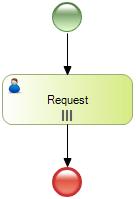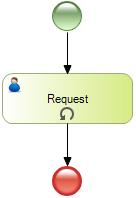Defines the type of loop condition on the number of instances to be created.
| Multi-Instance | Specifies the number of times the task will be executed. The condition is evaluated once and returns the number of instances that must be created. Two properties are added to be configured. |
| None | No loop condition is defined. The task is executed once and continues the flow. This is the default value. |
| Standard | A standard loop activity has an associated Boolean expression that is evaluated after each loop cycle. Three properties are added to be configured. |
Controls: Task
You can configure the Loop type property for a Task control included in a Business Process Diagram object.
The possible values of this property are described below:
1) Multi-Instance
Allows a Task to be executed a certain number of times.
When selecting this value, the following properties are offered to be configured:
1.1) Expression Type property
Allows you to choose how to determine the number of times the Task will be repeated. It can be by means of a Rule or a Procedure.
Values:
- Rule: Once this value is selected, the Expression rule property is offered to be completed. Allows you to specify an expression rule that will determine the number of times the Task should be repeated. It accepts characters, attributes, and relevant data (e.g. "Customer registration number"+CustomerId+&relevantData).
- Procedure: Once selected, the Expression procedure property is offered to be completed. It allows you to specify a Procedure object to determine the number of times the Task should be repeated.
This Procedure must have the following Parm rule:
parm(in:&WorkflowProcessDefinition,in:&WorkflowProcessInstance,in:&WorkflowWorkitem,out: &numberofinstances);
where the &numberofinstances variable must be Numeric (10).
1.2) Ordering property
Allows you to select the order in which the looped Tasks are executed, either all together or one at a time.
Values:
- Sequential: The instances are executed one at a time.
- Parallel: The instances are all executed at the same time.
- If you select Parallel value, the Flow condition property is offered to be configured. It determines how the flow continues: whether after all Tasks are executed or when the first Task is executed, the flow continues.
1.2.1) The Flow condition property has the following values:
None
For each completed instance, a parallel path will be followed.
One
When the first instance is completed, the flow will continue. The other instances will continue running, but they will not create a new path when they are completed.
All
The flow will only continue when all instances have been completed (synchronization).
This is the default value.
Complex
Defines an expression that will be executed when each instance is completed to check whether it should continue.

If you select Complex value, the following property is offered to be configured:
1.2.2) Complex flow condition type: Checks if the flow should continue.
This property has two values: Rule and Procedure.
- Rule: If you select Rule value, a new property is offered to be completed, called: Complex flow condition rule. Specifies a rule to evaluate the condition. If the condition is met, the flow continues for the instance of that Task.
- Procedure: If you select the Procedure value, a new property is offered, called: Complex flow condition procedure. Allows you to specify a Procedure object to evaluate the condition. If the condition is met, the flow continues for the instance of that Task.
This Procedure must have the following Parm rule:
parm(in:&WorkflowProcessDefinition,in:&WorkflowProcessInstance,in:&WorkflowWorkitem,out: &code)
Where the &code variable must be Numeric (4.0). If the &code variable returns 1, the flow will continue; otherwise, if it returns 0, the flow will not be continued.
2) None
No loop condition is defined. The Task is executed once and continues the flow. This is the default value.
3) Standard
With this type of loop, each time a loop Task is executed, a condition is checked to see if the loop should continue.
When selecting this value, the following three properties are offered in the Properties window:
3.1) Test Time property
Allows you to select whether the check is before or after the Task is executed.
Values:
- Before: The condition is evaluated before executing the Task.
- After: The condition is evaluated after executing the Task.
3.2) Condition Type property
Allows you to select the way in which the condition is to be checked, either with a Rule or a Procedure.
Values:
- Rule: Specifies a rule to evaluate the condition. It accepts characters, attributes, and relevant data (e.g. "Customer registration number"+CustomerId+&relevantData). If you select this value, the Condition rule property is offered to be configured.
- Procedure: Allows you to specify a Procedure object to evaluate the condition.
This Procedure must have the following Parm rule:
parm(in:&WorkflowProcessDefinition,in:&WorkflowProcessInstance,in:&WorkflowWorkitem,out: &code);
Where the &code variable must be Numeric (4.0). If the &code variable returns 1, the loop will continue; otherwise, if it
returns 0, the Task will be completed, and the flow will continue.
If you select this value, the Condition procedure property is offered to be configured.
3.3) Maximum Iterations property
Allows you to select the maximum number of times the Task can be executed in the loop. This property ignores the condition.

This property applies only at design time.
Attribute definition
Relevant Data
HowTo: Implement Loop Tasks in GXflow